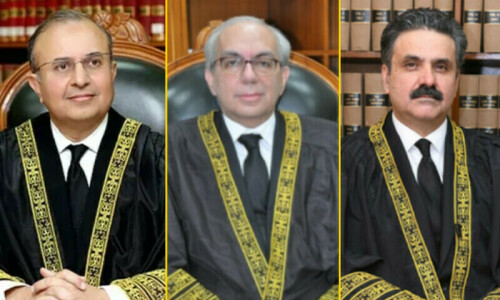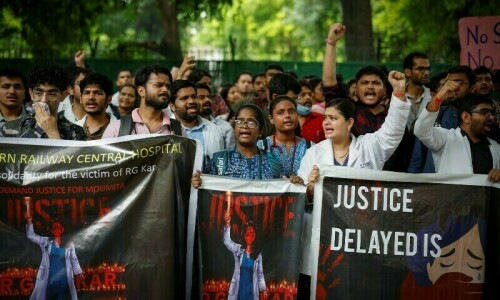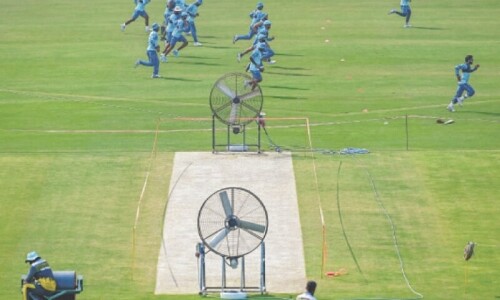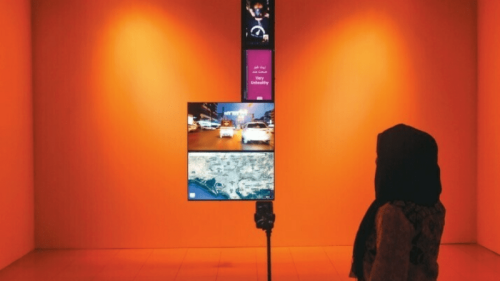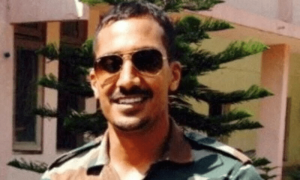ISLAMABAD, Sept 9: Although the ruling PML-N managed on Monday to garner across-the-board support from political parties represented in parliament for talks with militants, the military leadership made it clear that dialogue was possible only with “our people”, and not foreign elements active in tribal areas of the country.
Chief of the Army Staff General Ashfaq Parvez Kayani and Director General of the Inter-Services Intelligence Lt Gen Zaheerul Islam briefed politicians on the military’s engagements in the lawless tribal region at the government-sponsored All Party Conference which continued for over four hours.
The presence of a considerable number of foreign fighters, multiple factions of the Tehreek-i-Taliban Pakistan (TTP) and the absence of government’s writ, particularly in North Waziristan, were the “odds” which the military leadership said they were facing in the region.
In his about 40-minute presentation, the ISI chief informed the participants about the areas which had been cleared of militants in the tribal region and the ones where both foreign and local armed militants were based in North Waziristan.
The military’s current deployment in the region was also shared with the politicians. The gist of his briefing, according to a source, was that the government first would have to figure out those factions within the TTP which were local and willing to hold talks under the constitution of Pakistan.
It appeared to be the obvious reason that the APC in its eight-point resolution underscored the need for “negotiating peace with our own people in the tribal areas”.
And this is the only difference one can figure out in the declarations of two earlier APCs — one organised by the Awami National Party (ANP) on Feb 14 and the other by Jamiat Ulema-i-Islam (Fazl) on Feb 28. Both the conferences had recommended dialogue with the Taliban fighting against the army.
The Monday’s resolution asked the federal government to “initiate the dialogue with all stakeholders forthwith and to take all necessary steps as it may deem fit, including development of an appropriate mechanism and identification of interlocutors”.
There was no mention of the TTP or any other militant group active in the lawless tribal region. Instead, it said: “The process should be as inclusive as possible, with full participation of the government of Khyber Pakhtunkhwa and other stakeholders. The ‘guiding principles’ for talks should be respect for local customs and traditions, values and religious beliefs and the creation of an environment which brings peace and tranquillity to the region.”
A security analyst was of the opinion that the language of the resolution was as fuzzy as that of the previous ones and wondered how the government would achieve its objective of bringing peace to the tribal areas when it only endorsed the dialogue without any clear hint.
“There is clear missing of deterrence from the PPP government’s three Ds — dialogue, development, deterrence — policy to deal with the militancy in Khyber Pakhtunkhwa,” the analyst said.
But a senior government minister requesting anonymity claimed that the government had already started working on possible interlocutors for talks with the Taliban and had been in ‘informal’ contacts with them for a few weeks.
The conference expressed concern over non-implementation of the declarations of a number of APCs held in the past as well as parliamentary resolutions.
These included the two resolutions adopted at the APCs organised by the JUI-F and ANP; one held by former prime minister Yousuf Raza Gilani on Sept 29, 2011; one by a joint sitting of parliament on May 14, 2011, and another in-camera joint sitting on Oct 22, 2008; recommendations of the Parliamentary Committee on National Security in April 2009; and a resolution adapting the guidelines set by the PCNS and passed by a joint sitting of parliament on April 12 last year. The resolution acknowledged the sacrifices rendered by the armed forces but agreed that they didn’t receive due recognition.
Drone attacks
Referring to the issue of drone attacks in which thousands of Pakistanis had lost their lives because of ‘blowback’ from actions of Nato/Isaf forces in Afghanistan, the APC asked the government to consider the possibility of taking the issue to the United Nation because drone attacks were a clear violation of international laws.
The real issue — talks with the Taliban — came up in fourth of the resolution points. Referring to the outcome of an earlier APC held in September 2011, the conference decided to give “peace a chance” and said dialogue must be initiated with “our own people”. “It should be the first priority.”
Although the use of force is an obvious second option, it wasn’t mentioned in the 1100-word resolution drafted by Interior Minister Chaudhry Nisar Ali Khan.
In the fifth and sixth points, the resolution praised the federal government for its initiatives to deal with violence in Karachi and urged the chief minister of Balochistan to start dialogue with estranged Baloch elements.
In the seventh point, the APC asked the government to make all-out efforts for peace in Afghanistan through continuous and sustained engagements with its government and the people.
And in the last point, it ‘authorised’ the government to initiate dialogue with all stakeholders.
In his about ten-minute briefing, Gen Kayani assured the politicians of the army’s full support to whatever initiative the government decided to bring peace to the country.
Interior Minister Chaudhry Nisar informed the participants about the government’s initiative in Karachi and other areas against criminal elements.
In his introductory remarks, Prime Minister Nawaz Sharif said his government considered dialogue as a priority option to curb terrorism in the country. He said his party (PML-N) had stressed the need for serious dialogue in the previous APCs.
He said a solution to the issue of terrorism would be worked out with consensus after thorough deliberations by the participants.
Pakistan Tehreek-i-Insaf Chairman Imran Khan, Prime Minister Sharif and Army Chief Kayani held a separate meeting before the APC.
Politicians’ remarks
PML-Q chief Chaudhry Shujaat Hussain asked the prime minister to go ahead with his decision of holding talks or otherwise as people had given him the mandate to run the country.
He said consensus was a good thing, but it wasn’t mandatory all the time. After all it was the government of the day which had to take policy decision, he added.
Imran Khan said the country was suffering because of bad decisions taken after the 9/11, adding that the time had come to get out of the so-called war on terror. He said the government should take a clear stand on drone attacks.
In a handout issued after the APC, the PTI appreciated the resolution, terming it a vindication of its stand on drone attacks and for talks with militants.
Farooq Sattar of the MQM called for vertical collaboration between the federal and provincial governments to bring peace to the country.
Mehmood Khan Achakzai said it was a good omen for the country that the civilian and army leadership was on the same page.















